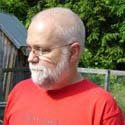Let me jump to the macroscopic view here for a moment. A way of catching my breath, really. We began by discussing W's treatment of Augustine's (clearly insufficiently complex) view of language & then watched as W began to develop a model with increasing complexity. But at some point in these early remarks comes an intellectual "tipping point," after which the nature of the project is transformed. At least that's the way I'm reading so far. Despite the fact that we find it hopelessly incomplete, Augustine, I think, wants to posit a complete theory of language. We know, of course, that Wittgenstein had attempted the same thing in the Tractatus. But we are lead--as W himself must have been led--to see that positing a complete theory of language is philosophically misguided. The question What is language? which seems so simple on its face, turns out to be incoherent. (When does Godel prove incompleteness for formal systems?) The mistake in the question is imagining that language is a) one thing & b) whole. John Dewey, in Experience & Nature, addresses this sort of error directly in his criticism of the various Idealisms that have flourished throughout the history of philosophy: "One of the most striking phases of the history of philosophic thought is the recurrent grouping together of unity, permanence, (or the "eternal"), completeness, and rational thought, while upon another side fall multiplicity, change and the temporal, the partial, defective, sense and desire. This division is obviously but another case of violent separation of the precarious and unsettled from the regular and determinate. One aspect of it, however, is worthy of particular attention: the connection of thought and unity. Empirically, all reflection sets out from the problematic and confused. Its aim is to clarify and ascertain. When thinking is successful, its career closes in transforming the disordered into the orderly, the mixed-up into the distinguished or placed, the unclear and ambiguous into the defined and unequivocal, the disconnected into the systematized. It is empirically assured that the goal of thinking does not remain a mere ideal, but is attained often enough so as to render reasonable additional efforts to achieve it." [John Dewey, Experience & Nature 57]
Claude Shannon, the father of information theory, qualifies his initial description of communication (setting aside for the moment the more vexed field of language). In 1948 Shannon published his landmark A Mathematical Theory of Communication. He begins this pioneering paper on information theory by observing that "the fundamental problem of communication is that of reproducing at one point either exactly or approximately a message selected at another point." He then proceeds to so thoroughly establish the foundations of information theory that his framework and terminology remain standard.
". . . or approximately." Yes. We have moved from thinking of language as a coherent, unified system of communication to thinking of language as something closer to an ecology. And most recently we have touched on licit & illicit uses of language, which raises a fundamental question: by whose authority is one use--your "presently" for example--ruled illicit while another is approved? Linguistics solves the problem by stating positivistically that language changes & one usage is not to be preferred to another. I accept this, but would observe that users of language still feel or sense some usages as licit, some illicit. I don't think we can "scientifically" banish that feeling on the part of users of language; a rich account of language will have to include the fact that users feel some ways of using language are correct while others are incorrect. I want to suggest that this distinction is fundamental to language & constitutes one of the elements of language games.
Philosophical Investigations
Christopher Robinson & Joseph Duemer read Wittgenstein's Philosophical Investigations


0 Comments:
Post a Comment
<< Home